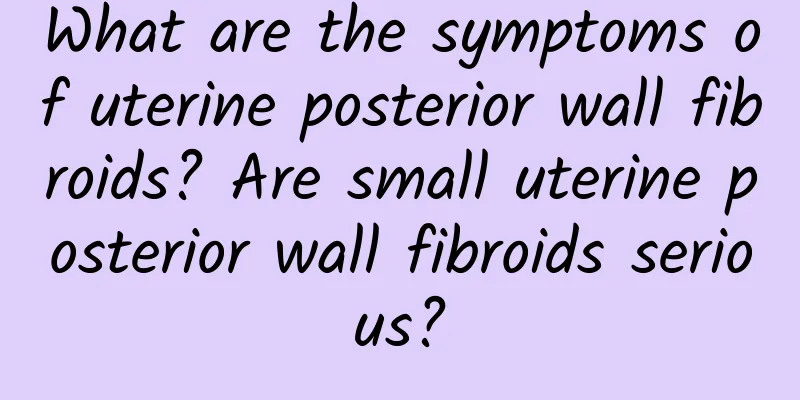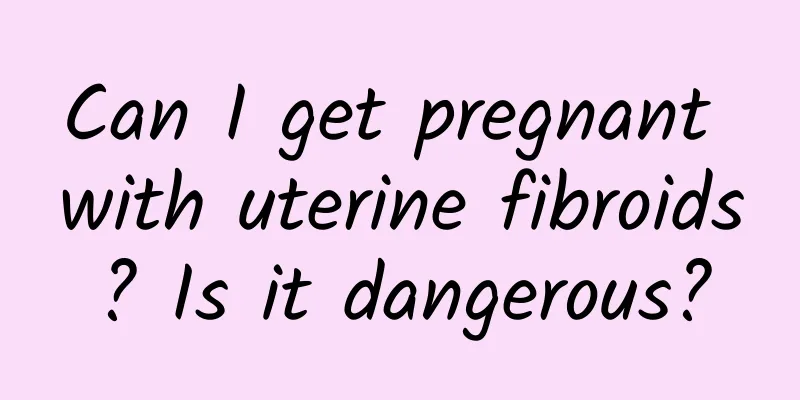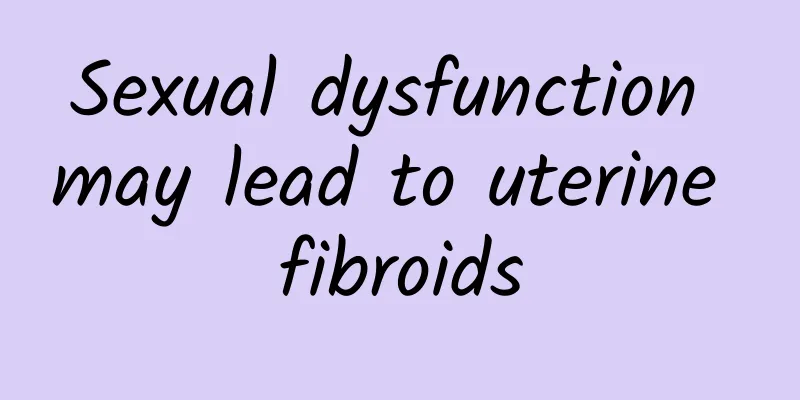What are the symptoms of uterine posterior wall fibroids? Are small uterine posterior wall fibroids serious?

|
Posterior uterine wall fibroids refer to fibroids that occur on the posterior wall of the uterus. It is a common gynecological disease. Although most posterior uterine wall fibroids do not cause obvious symptoms, some patients may experience some discomfort. This article will introduce the symptoms of posterior uterine wall fibroids and related issues in detail to help readers better understand this disease. 1. Different patients have different symptoms Symptoms of uterine posterior wall fibroids vary from person to person, and different patients may experience different symptoms. Some women may not experience any symptoms, while others may experience irregular menstruation, excessive or prolonged menstruation, pelvic pain, etc. Among them, the most common symptom is irregular menstruation, that is, irregular menstrual cycles, increased menstrual blood flow, or prolonged menstruation. Pelvic pain is caused by the enlargement of fibroids and compression of surrounding tissues. Other possible symptoms In addition to menstrual irregularities and pelvic pain, uterine posterior wall fibroids may also cause other uncomfortable symptoms. These include urinary system symptoms such as difficulty urinating, difficulty defecating, frequent urination, and urgent urination. The enlargement of fibroids compresses the bladder or rectum, leading to the appearance of these symptoms. If patients experience these symptoms, they should seek medical attention for examination and treatment in a timely manner. 3. Whether small uterine posterior wall fibroids are serious depends on the condition The severity of small uterine posterior wall fibroids varies from person to person, depending on the size, number and location of the fibroids. Generally speaking, small fibroids are relatively minor in clinical significance and do not cause significant symptoms and complications. However, if the small fibroids are large or in a specific location, they may have an adverse effect on the patient's life. At this time, appropriate treatment measures should be taken according to the specific situation. 4. Untreated complications may occur Although most uterine posterior wall fibroids are benign, they can still cause some complications if not treated in time. The most common complication is infertility. Uterine posterior wall fibroids may affect the implantation of fertilized eggs, leading to infertility. In addition, fibroids may also compress the ureter or rectum due to excessive growth, causing problems with the urinary and digestive systems. In summary, the symptoms of uterine posterior wall fibroids are a complex issue with large individual differences. Some patients may not experience any obvious symptoms, while others may experience discomfort such as irregular menstruation and pelvic pain. Although small fibroids generally do not cause obvious clinical problems, they may still lead to complications such as infertility. Therefore, if you suspect that you have uterine posterior wall fibroids, you should seek medical examination and consultation in time to determine the best treatment plan. Early diagnosis and treatment can help improve the patient's quality of life and reduce the occurrence of complications. |
Recommend
Experts talk about the treatment of Trichomonas vaginitis
Trichomonas vaginitis is a disease caused by exte...
What tests should be done before medical abortion? You need to do these 6 tests
The examination before medical abortion plays a v...
What are the disadvantages of having an abortion?
Artificial abortion is now the main means of term...
Is pelvic peritonitis contagious?
Is pelvic peritonitis contagious? Pelvic peritoni...
How can women correctly diagnose ovarian cysts?
What are the symptoms of ovarian cysts? Ovarian c...
What is cervical cyst?
Women's body structure is very special. Once ...
Is there any oral medicine for cervical warts?
Many people suffer from cervical warts in our dai...
Don’t be picky about New Year’s dishes! Weight may increase by 2 kg after the new year
This pork trotter with dried bamboo shoots is shi...
Will there be obvious pain during medical abortion when the pregnancy is more than 40 days old?
Pregnancy lasts about 40 days. If you suddenly do...
Which women are more likely to get uterine fibroids?
Uterine fibroids are a common gynecological disea...
Who are suitable for painless abortion?
There are many types of abortion surgeries, and p...
Women should know before doing painless abortion
Abortion surgery is mainly for women with unexpec...
How to take care of uterine fibroids after surgery? What is the best food for uterine fibroids?
Uterine fibroids are common benign tumors in wome...
What are the causes of adnexitis in unmarried women?
According to medical research, adnexitis is not a...
Can’t get rid of lower body fat? Chinese medicine doctor Zhang Wenxin shares 3 secrets to create supermodel legs
Office workers often sit for long periods of time...









